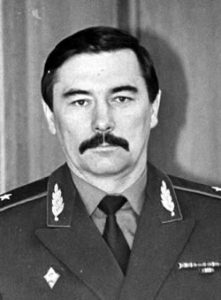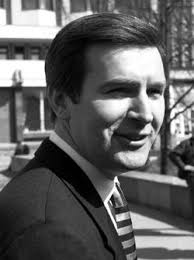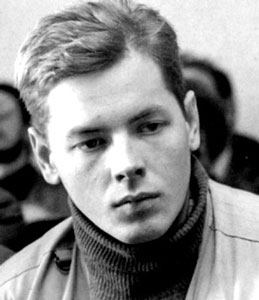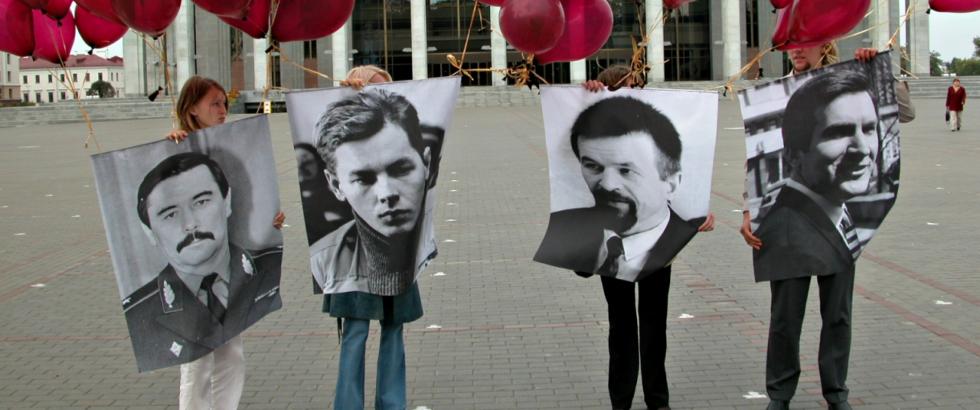 Yury Zakharenka was the Minister of Internal Affairs of Belarus in 1995-1996, but was dismissed by Lukashenka in 1996. Zakharenka soon became one of the leaders of the Belarusian political opposition. Belarusian officers began joining him en masse. In the evening of May 7, 1999, Yury Zakharenka was kidnapped and spirited away to an unknown location.
Yury Zakharenka was the Minister of Internal Affairs of Belarus in 1995-1996, but was dismissed by Lukashenka in 1996. Zakharenka soon became one of the leaders of the Belarusian political opposition. Belarusian officers began joining him en masse. In the evening of May 7, 1999, Yury Zakharenka was kidnapped and spirited away to an unknown location. Viktar Hanchar. After winning the 1994 presidential election, Lukashenka appointed Viktar Hanchar Deputy Prime Minister of Belarus. Hanchar soon began criticizing the newly elected Lukashenka and resigned. In 1996, the Belarusian parliament appointed Hanchar Chairman of the Central Election Commission. He never recognized the referendum of 1996, which gave Lukashenka unlimited power and added two more years to the presidency. Contrary to the acting Constitution, Lukashenka dismissed him and appointed Lidia Yermoshina, who has chaired the Central Election Committee since 1996. Although the referendum was held with major irregularities and was not recognized by the international community, Yermoshina approved its results. Hanchar began collecting evidence of Lukashenka’s usurpation of power. On September 16, 1999, three days before their publication, Viktar Hanchar was kidnapped and presumably murdered.
Viktar Hanchar. After winning the 1994 presidential election, Lukashenka appointed Viktar Hanchar Deputy Prime Minister of Belarus. Hanchar soon began criticizing the newly elected Lukashenka and resigned. In 1996, the Belarusian parliament appointed Hanchar Chairman of the Central Election Commission. He never recognized the referendum of 1996, which gave Lukashenka unlimited power and added two more years to the presidency. Contrary to the acting Constitution, Lukashenka dismissed him and appointed Lidia Yermoshina, who has chaired the Central Election Committee since 1996. Although the referendum was held with major irregularities and was not recognized by the international community, Yermoshina approved its results. Hanchar began collecting evidence of Lukashenka’s usurpation of power. On September 16, 1999, three days before their publication, Viktar Hanchar was kidnapped and presumably murdered. Anatoly Krasouski, a well-known Belarusian businessman, disappeared along with Viktar Hanchar on September 16, 1999. He was a good friend of Hanchar and widely supported and financed the opposition.
Anatoly Krasouski, a well-known Belarusian businessman, disappeared along with Viktar Hanchar on September 16, 1999. He was a good friend of Hanchar and widely supported and financed the opposition. Dzmitri Zavadski. Dissidents continued disappearing well into the 2000s. On July 7, journalist and cameraman Dzmitri Zavadski, who worked for Russian Public Television Channel One (ORT), travelled to Minsk-2 Airport in a company car to meet his colleague Pavlo Sheremet. His empty car was found later near the airport, but his body has yet to be found. According to the Committee to Protect Journalists, its sources in Belarus suspect that Zavadski was murdered because he had footage showing Belarusian security agents fighting in Chechnya alongside Chechen rebels
Dzmitri Zavadski. Dissidents continued disappearing well into the 2000s. On July 7, journalist and cameraman Dzmitri Zavadski, who worked for Russian Public Television Channel One (ORT), travelled to Minsk-2 Airport in a company car to meet his colleague Pavlo Sheremet. His empty car was found later near the airport, but his body has yet to be found. According to the Committee to Protect Journalists, its sources in Belarus suspect that Zavadski was murdered because he had footage showing Belarusian security agents fighting in Chechnya alongside Chechen rebels
In 2001, one of the candidates in the Belarusian presidential election, Vladimir Honcharyk published a document by the Chief of the Criminal Police Mykola Lapatik, which reported that the country’s top leadership, namely the then State Secretary of the Security Council, Viktor Sheiman, was involved in the killings of the opposition figures. A report by Colonel Oleg Alkayev, who was Director of detention centre No.1 in Minsk in 1996-2001 and directly responsible for executing the death penalty, was also published. Alkayev claims that he issued a special execution pistol on the day of the disappearance. The pistol was indeed signed out twice by order of the then Minister of the Interior, Yury Sivakov, during periods coinciding with the disappearances of Zakharenka on May 7, 1999 and Hanchar and Krasouski on September 16, 1999.
Two Belarusian police investigators, Dmitry Petrushkevich and Oleg Sluchek, who fled abroad, stated in 2001 that Yury Zakharenka, Viktar Hanchar and Anatoly Krasouski were executed by a death squad, which was specially set up to eliminate both private businessmen and political opponents. Colonel Dmitry Pavlichenko was appointed commander of this special unit. Officially, he commanded the SOBR, a special rapid response unit within the Ministry of Internal Affairs of Belarus. Pavlichenko was arrested at the request of the Belarusian KGB and the Prosecutor General’s Office, but released almost immediately. Prosecutor General Oleg Bozhelko and KGB Chairman Vladimir Matskevich were removed from office by Lukashenka, and Viktor Sheiman, one of Lukashenka’s closest associates, was appointed Prosecutor General of Belarus.
In Sepember 2019, former SOBR fighter Yury Garavski, who was also forced to flee to the West, contacted the Russian service of Deutsche Welle and gave a sensational interview. He claimed that he was a member of the death squad headed by Dmitry Pavlichenko and himself took part in the kidnapping and murder of Yury Zakharenka, Viktar Hanchar, and Anatoly Krasouski. Garavski states that opposition politicians were personally executed by Dmitry Pavlichenko, but the former SOBR commander denies this.
Alyaksandr Lukashenka also denies ordering the kidnappings and murders.
“I have never given and will not give such an order in my life! My answer is simple. Why would I need to do that? Why?! What has changed if two or three people go missing in Belarus? Especially the cameraman everybody’s talking about - Dima Zavadski, who died,” he said in an interview with Echo Moskvy almost immediately after the Deutsche Welle investigation.

